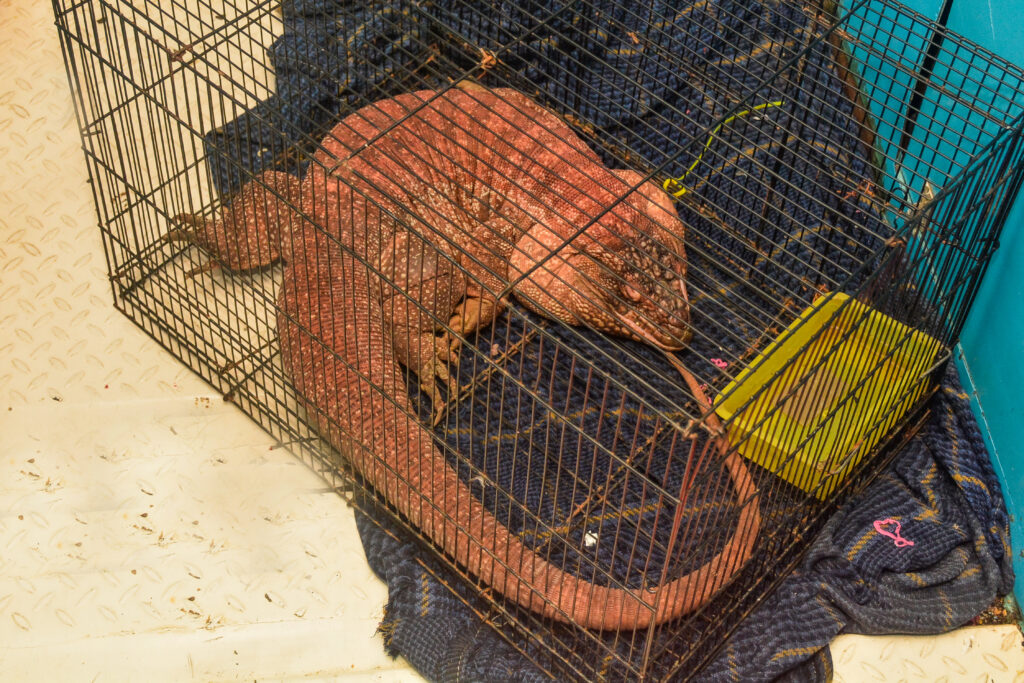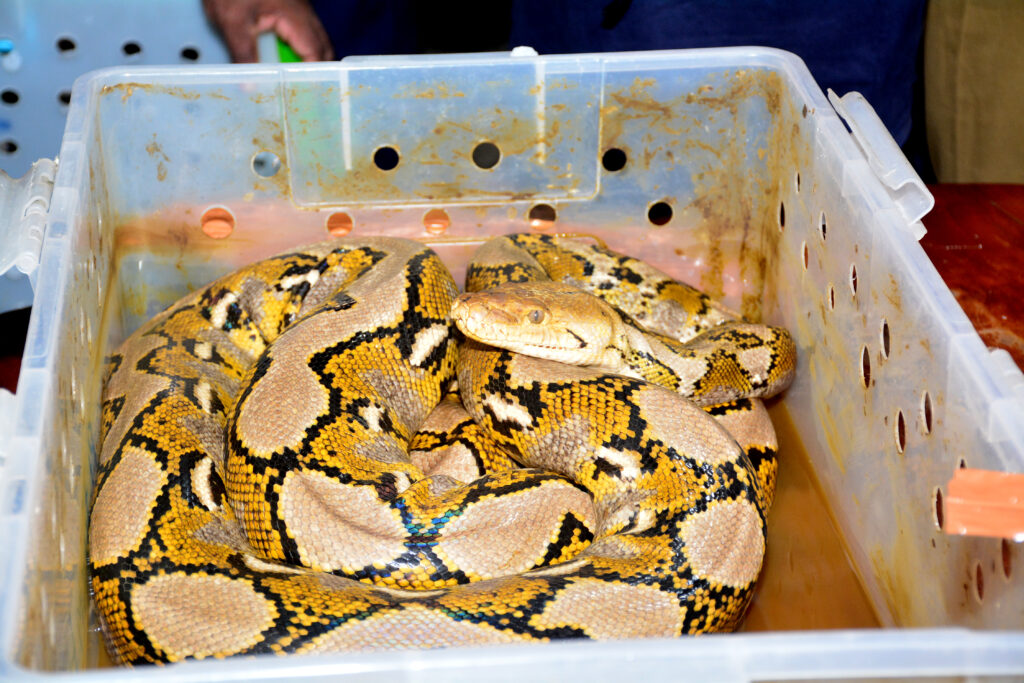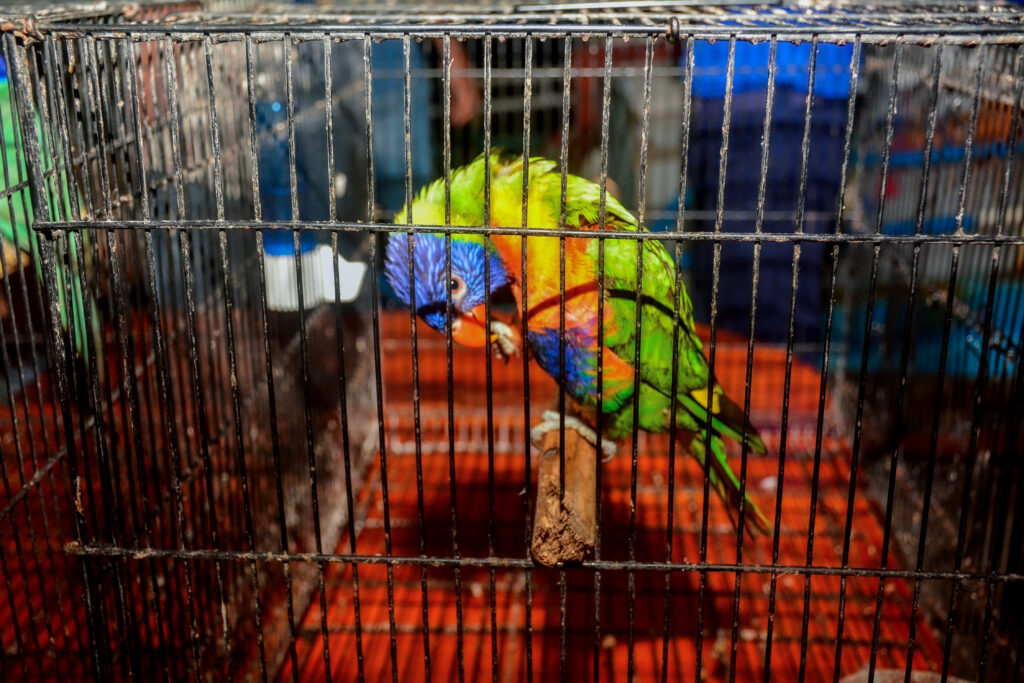
By Marlon Dale Ferreira
Sri Lanka’s primary entry ports have long been infamous for the smuggling of banned items such as narcotics, gold, and tobacco products. However, recent discoveries indicate the presence of a multi-million dollar international smuggling ring involving the illegal importation of Ball Pythons.
The python racket is done mainly by passengers arriving on what one customs official described as ‘unsuspicious’ flights, mainly carrying tourists where most of them are allowed to exit the airport through the green channel.
The reason for this is that the country which is desperately in need of improving the tourist industry does not wish to delay foreign visitors by searching their baggage.
The slithery reptiles found mainly in countries such as Malaysia, Indonesia, and Thailand just to name a few are believed to be cleverly packed into the unaccompanied baggage of the carrier.
The extent of this racket was not known to the local authorities until in the last week of August when police raided an up market shop in the Colombo suburbs and recovered some pythons with other wildlife species.
Prior to that on June 7, the Sri Lankan Navy intercepted a suspicious fishing craft in search of narcotics, but instead they stumbled upon 16 Ball Pythons and some other endangered wildlife species.
The twin detections have now placed the issue on top alert and environmentalists believe that hundreds of such reptiles may already have been smuggled into the country, sometimes with the connivance of warrant officials.
The Ball Pythons fetch extraordinary prices and the customers are believed to be millionaires with a hobby for wildlife species.
Although this particular reptile exists in tropical climates it has however never been sighted in Sri Lanka, which is a tropical island as well.
Known or unknown to Customs officials, these reptiles mainly from South Eastern Asian countries such as Thailand, Indonesia and Malaysia just to name a few, have entered the Sri Lankan market in what officials describe as a multi-million rupee illicit business often helped with online facilities and in some cases face to face contact between buyer and seller.
The duration or the volume of this racket is not known to local officials but environmentalists and others believe it is deeply embedded in the country simply because these reptiles enjoy tropical weather conditions and their upkeep has a very minimal expense.
The trading of these foreign pythons as well as other protected foreign species such as exotic birds and even lizards is carried out in a clever and clandestine manner where the relevant officialdom often ends up staring at a blank wall when investigating a particular case or cases.
However in the most recent detection the police were able to successfully raid an up market pet shop in the heart of the Wattala Town on Wednesday, situated just a few miles from the country’s commercial capital of Colombo.
What the police found during the raid carried out on a tip-off were four full grown foreign pythons known as Ball Pythons and a local crocodile captured from a lake in the dry zone of the country.
Police later transferred the animals to the Dehiwala National Zoo while the suspects were scheduled to be produced before the Wattala Magistrate’s Court.
This is the second known case to be highlighted inside a period of less than two months of the current year.
On July 7, the Sri Lanka Navy deployed Sri Lanka Coast Guard ship Suraksha seized a local multi-day fishing trawler and apprehend five suspects in connection with the smuggling of several bird and reptile species including 13 foreign pythons. The operation was mounted in the southern waters on July 7, 2024.
This operation was conducted based on a comprehensive information analysis by Naval Intelligence over an extended period, focusing on a smuggling racket of birds and reptiles to the country.
The find on the fishing trawler included 13 pythons, a monitor lizard, one tortoise and three parrots raising concerns over an act of wildlife smuggling.
This is the first ever detection of this nature known to the navy who largely concentrate on combating the smuggling of narcotics and human trafficking on the high seas between the Palk Straits and elsewhere, says the Navy Spokesman Captain Gayan Wickramasuriya.
He said the fishing trawler was escorted to the Galle Harbour where officials of the Department of Wildlife Conservation examined the animals and identified them as non-native species to Sri Lanka.
It is thought that these animals were to be loaded onto another boat heading for a Middle East Destination and the locals were involved in the transshipment process and nothing else, Captain Wickramasuriya said.
He added that the navy was concentrating now diligently conducting operations to combat smuggling activities of this nature that could harm the country’s ecosystem.
However, having said all that a senior environmentalist believes the recent detections by navy and police were just the tip of the iceberg and there is plenty more to be done if this illicit trade is to be discouraged or outlawed altogether.
Prominent environmentalist Jagath Gunawardene told The Morning Telegraph that the Customs authority has a larger role to play in combating this illicit trade, but stops short of blaming them altogether.
Probably they are in need of more manpower and modern technology if they are to make more detections at the border crossing, meaning the Bandaranaike International Airport and other sea entry points into the country and they must work towards this end at the very earliest.
He suggested that a tri parte unit made up of the Customs, Police and the Wildlife Department to be created and where they could work and cooperate with environmentalists and wildlife lovers as a first step in combating this illicit trade.
“It is an uphill task altogether but at the same time it has to be scaled in a way that it is currently being carried out in many developed countries and elsewhere”, Gunawardene said.
He added that the smuggled exotic birds, reptiles and animals are mainly for local wealthy wildlife collectors while there could also be a few foreign buyers but at the same time he did not rule out the possibility that some of the selected reptiles may even find themselves on the dishes of up market restaurants.
“However this theory cannot be confirmed since there are no known cases up to date, but on the other hand the possibility remains”, said.
Foreign wildlife species are allowed to be imported into the country only with the approval of the Department of Wildlife Conservation and nothing else.
Detections in the past have found out that none of the owners were in possession of approval documents which only goes on to suggest the wide capacity of smuggling that is sometimes carried out with errant officials on the take, Gunawardene who is also a lawyer said.
Permission has to be sought under Section 37 of the Fauna and Flora Ordinance and issued by the Wild Life Department if one chooses to maintain an exotic bird, animal or whatever creature or else it is a very serious offence, according Gunawardene.
He added that a State unit known as the Sri Lanka Wildlife Enforcement Network (SLWLEN) is also currently in operation and works towards the same subject.
The Customs authority in the past have made several detections on the illicit import and export of wildlife species but there has never been a known case of pythons being smuggled into the country, a senior Customs official said.
The smugglers are known to use clever tactics and getting at them is a difficult task, although we remain on the alert and follow up whatever information that is provided to us, he conceded.
He also added that limited checking is carried out on flights from Europe and across the pacific because they are listed in the non-suspicious capacity and rigid checking of their personal baggage could harm the tourist industry.
Meanwhile. initial police investigations have found out that the pythons were brought into the country through the passenger entry terminal and the person could either be a foreigner or even a local.
Ball Python Types: How Much Does a Ball Python Cost?
| Ball Python Morphs | Cost |
| Yellow Belly Ball Python | $65-$75 |
| Enchi Ball Python | $65-$75 |
| Ivory Ball Python | $245-$255 |
| Pied Ball Python | $395-$405 |
| Black Eyed Leucistic Ball Python | $445-$455 |
Current market prices, but keeps changing with time.



Pics: Courtesy Sri Lanka Navy




